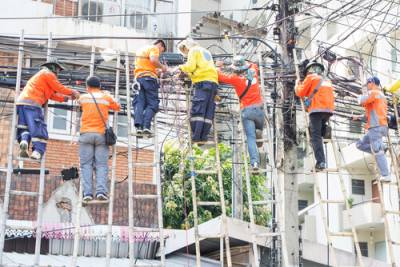Recent Blog Posts
Protecting Your Rights as an Injured Kitchen Employee
 Working in a kitchen is one of the most physically demanding occupations, and kitchen work can be extremely dangerous. From sharp knives to hot grease and steam, kitchen employees face numerous potential workplace dangers. What can you do if you have been injured while working in a kitchen? An experienced California workers’ compensation lawyer can help you understand your rights as an injured worker and how to file a workers’ compensation claim.
Working in a kitchen is one of the most physically demanding occupations, and kitchen work can be extremely dangerous. From sharp knives to hot grease and steam, kitchen employees face numerous potential workplace dangers. What can you do if you have been injured while working in a kitchen? An experienced California workers’ compensation lawyer can help you understand your rights as an injured worker and how to file a workers’ compensation claim.
Understanding Workers’ Compensation
If you have been injured while working in a kitchen—whether you work in a restaurant kitchen, an institutional or commercial kitchen, or any other type of kitchen—you may be entitled to workers compensation benefits. Workers’ compensation benefits in California are intended to provide financial assistance for medical bills, lost wages, and other expenses related to your injury.
To receive benefits, you will need to show that your injury occurred while performing work-related tasks. For example, a severe burn or knife cut that you sustained on the job would very clearly be work-related, while tripping and falling on your way into work might not be considered as such. It is important to keep detailed records of your injuries as well as any incident reports that were filed following the accident. You should also collect any witness statements or medical documents related to your injury.
What Types of Benefits Does California Workers Compensation Provide?
 No matter the job, no matter the field, California workers’ compensation exists to provide assistance to those who are injured at work. Nearly all employers in the state of California are required to carry workers' compensation insurance, with minor exceptions. If you are hurt on the job, your employer is supposed to report your injury to the Division of Workers’ Compensation (DWC) so your benefits can begin. However, insurers and employers often attempt to deny workers’ compensation claims, even if they have merit. A workers’ compensation lawyer can help you claim your benefits if your employer does not want to cooperate.
No matter the job, no matter the field, California workers’ compensation exists to provide assistance to those who are injured at work. Nearly all employers in the state of California are required to carry workers' compensation insurance, with minor exceptions. If you are hurt on the job, your employer is supposed to report your injury to the Division of Workers’ Compensation (DWC) so your benefits can begin. However, insurers and employers often attempt to deny workers’ compensation claims, even if they have merit. A workers’ compensation lawyer can help you claim your benefits if your employer does not want to cooperate.
Benefits Provided by Workers’ Compensation
To better ensure that you receive benefits in a timely manner, you must report your injury to your employer within 30 days of the accident or at the earliest time possible. The types of benefits you receive will depend on the extent of your injuries.
What You Should Know About Returning to Work After a Workplace Accident
 Despite the availability of workers’ compensation benefits for those injured on the job, for many injured workers, one of the most pressing concerns is returning to work as soon as possible. Whether this is due to a strong work ethic or a realization that in some cases workers’ compensation benefits may not be enough to fully compensate an employee who is unable to perform his or her job duties, some injured workers’ desire to get back on the jobsite is so strong that they may end up doing more harm than good – both to their workers’ compensation case and to their health.
Despite the availability of workers’ compensation benefits for those injured on the job, for many injured workers, one of the most pressing concerns is returning to work as soon as possible. Whether this is due to a strong work ethic or a realization that in some cases workers’ compensation benefits may not be enough to fully compensate an employee who is unable to perform his or her job duties, some injured workers’ desire to get back on the jobsite is so strong that they may end up doing more harm than good – both to their workers’ compensation case and to their health.
Your Doctor’s Orders Should Prevail
In deciding whether to return to work, you should always pay attention to the recommendations of your treating physician. This doctor will be the person in the best position to recommend returning to work or remaining off of work for a few more days. If you believe you are ready to return to work, your doctor may be able to allow you to return to work—provided that you adhere to some limitations or restrictions (in some cases). Returning to work without your doctor’s permission can not only jeopardize your health and safety (and that of your coworkers), but it can also cause difficulties for your workers’ compensation claim and benefits.
Surprising Ways a Work-Related Back Injury Can Affect Your Life
 Anyone who has ever suffered a back injury knows just how painful these injuries can be. When a work-related incident leads to a back injury, the worker can be left with limited capabilities. Some back injury sufferers are unable to work at all. Back pain is the leading cause of disability across the globe.
Anyone who has ever suffered a back injury knows just how painful these injuries can be. When a work-related incident leads to a back injury, the worker can be left with limited capabilities. Some back injury sufferers are unable to work at all. Back pain is the leading cause of disability across the globe.
Auto accidents, strenuous activities, and repetitive stress are just some of the ways workers can suffer neck and back injuries while on the job. The results of a serious back injury can affect an individual’s life professionally, financially, physically, and psychologically.
Workplace Accidents and Repetitive Strain Can Lead to Back Injuries
Sometimes, a spine injury is the result of a sudden accident like falling or being involved in a car crash. Other spine injuries are the result of repetitive stress. Sitting in an ill-fitting office chair, standing all day, or carrying heavy objects can lead to repetitive stress back injuries. A serious back injury or neck injury can affect nearly every aspect of a person’s life.
Help! I Think My Workers Compensation Insurer is Spying on Me!
 An employee who suffers a work-related injury or illnesses is likely to be entitled to financial compensation through their employer's workers' compensation insurer. The injured person may be eligible for benefits to cover medical expenses such as hospital care and medication, as well as part of their lost income and other considerations.
An employee who suffers a work-related injury or illnesses is likely to be entitled to financial compensation through their employer's workers' compensation insurer. The injured person may be eligible for benefits to cover medical expenses such as hospital care and medication, as well as part of their lost income and other considerations.
Unfortunately, recovering compensation through workers' compensation is not always straightforward. Many different issues may complicate the process. Employers and workers’ compensation insurance companies may attempt to reduce or eliminate the employee's workers' compensation benefits. Sometimes, insurance companies even conduct surveillance on injured employees, ostensibly hoping to prove that the employee is not as injured as they claim to be.
Workers' Compensation Surveillance Tactics
Insurance companies seek to minimize payouts to injured employees whenever possible. One way insurance companies may try to get out of paying workers' compensation benefits is to challenge the validity or extent of the employee's injuries. The insurer may conduct surveillance of the injured person in an effort to "catch" the employee acting in ways that suggest their injuries are fabricated or exaggerated.
How Can I Protect My Right to Compensation After Being Injured on the Job?
 In an average year, some two-and-a-half million American workers suffer a work-related injury or illness. Many are fortunate to sustain relatively minor injuries and can go back to work quickly. Others, however, suffer much more serious injuries, including spine and head injuries, which cause them to miss work for long periods of time. In the most severe cases, the injuries can be catastrophic, leading to permanent disability or even death. Regardless of the severity of the injury, all injured workers need to know how to ensure their rights are protected as they seek compensation for their injuries—especially if they are seeking benefits under the California workers’ compensation system.
In an average year, some two-and-a-half million American workers suffer a work-related injury or illness. Many are fortunate to sustain relatively minor injuries and can go back to work quickly. Others, however, suffer much more serious injuries, including spine and head injuries, which cause them to miss work for long periods of time. In the most severe cases, the injuries can be catastrophic, leading to permanent disability or even death. Regardless of the severity of the injury, all injured workers need to know how to ensure their rights are protected as they seek compensation for their injuries—especially if they are seeking benefits under the California workers’ compensation system.
Report Your Injury Quickly
When you suffer an injury at work, you should report the injury to your employer right away or as soon as reasonably possible. You must report your injury within 30 days, or you risk losing your eligibility for work compensation benefits. Your injury must be reported so that your employer can conduct a proper investigation into the circumstances. Do not risk losing your benefits. Report your injury to your employer immediately.
Workers’ Compensation Benefits and PTSD
 In today’s world, we are more aware of mental health concerns than perhaps ever before. As a result, we have learned a great deal about a variety of conditions that were previously considered to be "no big deal," but that can be downright debilitating in many situations. A good example of this can be found with post-traumatic stress syndrome, commonly abbreviated as PTSD. What was once thought of as "battle fatigue" or "shell shock" and associated mainly with military members who saw combat is now known to be a danger for nearly anyone who has gone through or witnessed an especially scary, dangerous, or shocking experience.
In today’s world, we are more aware of mental health concerns than perhaps ever before. As a result, we have learned a great deal about a variety of conditions that were previously considered to be "no big deal," but that can be downright debilitating in many situations. A good example of this can be found with post-traumatic stress syndrome, commonly abbreviated as PTSD. What was once thought of as "battle fatigue" or "shell shock" and associated mainly with military members who saw combat is now known to be a danger for nearly anyone who has gone through or witnessed an especially scary, dangerous, or shocking experience.
Post-traumatic stress syndrome can become a major concern for those who have been in car crashes, those who were assaulted or raped, and even those who suffered or witnessed a tragic event on the job. If you or a loved one has been diagnosed with PTSD due to an incident that occurred at work, workers’ compensation benefits may be available.
Can I Collect Workers' Compensation Benefits If I Was Injured While Working From Home?
 Over the last few years, more and more employers have embraced the idea of allowing their employees to work from home. What started as a necessity during the COVID-19 crisis and subsequent lockdowns has become a new normal for many companies in California and around the country.
Over the last few years, more and more employers have embraced the idea of allowing their employees to work from home. What started as a necessity during the COVID-19 crisis and subsequent lockdowns has become a new normal for many companies in California and around the country.
But what happens when an employee who works from home gets injured while on the clock? Is that person still eligible to collect workers' compensation benefits? If it is possible to get benefits, will being a work-from-home employee complicate the case? The answers to these questions, as with most legal concerns, depend on the specifics of the situation.
Working From Home Makes Your Home Your Workplace
The first thing to understand is that, if you are injured while working from home, your home is considered your workplace. That means that the same rules and regulations that apply to traditional workplaces also apply to work-from-home setups.
What You Need to Know About the "Fatal Four" Workplace Dangers
 Every year, thousands of workers are killed on the job in the United States. The vast majority of these deaths are preventable if the right safety precautions are taken. Today, we will discuss the "Fatal Four" workplace dangers that account for the largest percentage of worker fatalities each year. If you want to keep yourself and your loved ones safe, it is important to be aware of these dangers and take steps to protect yourself from them.
Every year, thousands of workers are killed on the job in the United States. The vast majority of these deaths are preventable if the right safety precautions are taken. Today, we will discuss the "Fatal Four" workplace dangers that account for the largest percentage of worker fatalities each year. If you want to keep yourself and your loved ones safe, it is important to be aware of these dangers and take steps to protect yourself from them.
The Fatal Four
The construction industry is among the most dangerous industries for workers, accounting for about 1,000 workplace fatalities per year in this country. On average, about 60% of these fatalities are attributed to just four specific dangers that the Occupational Safety and Health Administration (OSHA) has labeled as the "Fatal Four." The Fatal Four include the following:
Fatal Four Danger #1: Falls From Heights
The first of the Fatal Four is falls. Falls from heights are one of the most common causes of workplace fatalities, accounting for over 350 deaths each year. If you work in a job that involves any kind of height, it is important to wear the proper safety equipment and to follow all safety procedures. Even if you simply use a ladder occasionally in the course of your job, you should be aware of the potential for falls at your workplace and take the appropriate precautions.
Workers' Compensation and Pre-Existing Conditions
 Many people are under the false impression that they cannot collect workers' compensation benefits if they had a pre-existing condition before being injured at work. The good news is that this is not entirely true. If you have been injured at work, you may be entitled to workers' compensation benefits, regardless of whether you had a pre-existing condition. In fact, if you aggravated a previous injury while on the job, a qualified workers’ compensation attorney can help you get the benefits to which you are likely entitled under the law.
Many people are under the false impression that they cannot collect workers' compensation benefits if they had a pre-existing condition before being injured at work. The good news is that this is not entirely true. If you have been injured at work, you may be entitled to workers' compensation benefits, regardless of whether you had a pre-existing condition. In fact, if you aggravated a previous injury while on the job, a qualified workers’ compensation attorney can help you get the benefits to which you are likely entitled under the law.
What is a Pre-Existing Condition?
For the purposes of this discussion on workers’ compensation, a pre-existing condition is a medical condition that you had before you were injured at work. It is important to note that a pre-existing condition does not have to be permanently disabling in order to be covered by workers' compensation. Even if your pre-existing condition was only temporary or minor, you may still be able to collect benefits if your workplace injury aggravated or worsened the condition.








